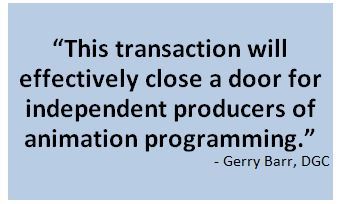
GATINEAU – Interveners continued to insist the CRTC impose strict safeguards on Corus Entertainment to ensure that its acquisition of Teletoon and other services don’t negatively affect independent producers, reduce diversity of voices or open the door to anti-competitive behaviour.
On the second day of the hearing, the Directors Guild of Canada (DGC) argued that Commission approval of Corus’ acquisition of Teletoon will eliminate the safeguard as it relates to programming investment decisions being made independently of the Teletoon’s shareholders. “As a result, this transaction will effectively close a door for independent producers of animation programming,” Gerry Barr, senior advisor of public affairs at the Guild, said during his opening remarks.
DGC reiterated its position that approving this transaction could have negative consequences on diversity of voices in response to a question from Ontario regional commissioner Raj Shoan. It argued for strengthened conditions of licence in the areas of spending and exhibition of Canadian programming as well as limiting the repurposing of Teletoon content on other services.
Peter Murphy, national policy manager art DGC, acknowledged that Corus’ behaviour has been good, but noted that there has been a structural shift in terms of ownership in the sector. “With that change comes a danger – and the danger is to diversity of voice and one of the ways of addressing that is through a reinforcement of these assurances,” he said.
The Public Interest Advocacy Centre (PIAC) is firmly against the transaction. It outlined a number of reasons why approving the transaction wouldn’t be in the public interest, including vertical integration not creating more retail affordability or flexibility, the Shaw-Corus market dominance (discussed during the hearing’s first day, yesterday) could have negative impacts on diversity of voices, and the potential negative impacts of taking Canadian programming to international audiences.
Alysia Lau, legal counsel at PIAC, noted that approving the transaction would give Shaw-Corus an enormous amount of control over Canadian content. It would become the largest holder of Category A specialty services, be the second largest player in the pay and specialty services market and become the dominant provider of children’s and youth programming.
“In our view, this transaction reduces the diversity of voices in the broadcasting system and effectively solidifies the control that Shaw/Corus and Bell will have over the pay and specialty TV market,” she argued. Under questioning Lau urged the commission to see the Corus transaction in the same light as Bell Media’s purchase of Astral.

“The problem for us is that there is always going to be an incentive when you have access to distribution undertakings as well as media assets for that to negatively impact on your willingness to negotiate on wholesale level. And based on that, we don’t see a difference between Bell’s application and this application today,” she said.
While being firmly against the transaction, if it is approved, PIAC urged the commission to order Corus to pay to pay tangible benefits on the order of $27.2 million on Historia and Series+.
Corus took its place before the Commission later Wednesday morning to defend the proposed transaction in the hearing’s reply phase. Gary Maavara, executive VP and general counsel, argued that the interveners have it wrong when they spoke about potential negative impacts arising from vertical integration. He noted that the licences will be reviewed in 2016 which is prior to the expiry of carriage arrangements, not the other way around.
“It is precisely because this review will occur before expiry of most of the carriage agreements that our point has merit. The Commission will have an opportunity to consider and impose the appropriate rules on all of our services before we have to go back and negotiate with them. So they kind of flipped the argument. You see us first and then we see them with your rules,” he said.
With respect to having to pay benefits on the purchase of the 50% ownership in Historia and Series+ Corus didn’t already own, the company said the policy is clear. It’s not triggering a change in control and therefore doesn’t have to pay benefits. Intervener arguments that this transaction is similar to the 2006 Bell Globemedia change of ownership proceeding and because of its importance requires benefits to be paid don’t hold water, added Maavara.
“The Commission rejected the arguments since this would amount to an amendment of the benefits policy described in Decision 2006-309 at paragraph 44. The Commission should similarly reject the arguments of interveners in our proceeding,” he said.
The argument made by interveners that Corus’ export proposal should not be considered onscreen benefits was also discounted by the company. Maavara noted that under the current system, producers are handed a cheque and aren’t asked how the funds are going to be used. He acknowledged that the existing pool of tax credits, Canada Media Fund (CMF), and licence fees help to green-light project, but added that producers need an international deal to complete their financing.
“If we wish to establish a viable industry, we will need to develop our exports. Nelvana is a success because we have invested in the ability to export to 160 countries,” he said. “The export funds would be administered by CMF and Telefilm. We don’t envision the fund being just about buying plane tickets to attend markets, our view is that more structural work can be done such as fostering bilateral agreements and establishing other tools to open doors for Canadian producers.”
A decision on the transaction is expected before the end of the calendar year.


